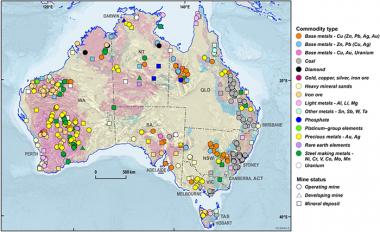Australian mining town picked for first large CSP plant; US team unveils $30/MWh power-heat system
Our pick of the latest solar thermal news you need to know.

Related Articles
Vast Solar in talks to build CSP plant in Queensland
Vast Solar is in talks to build a 50 MW hybrid CSP-PV-gas plant in the off-grid Mount Isa mining town in Queensland, Australia, local media reported.
The A$600 million ($420.0 million) plant would combine CSP with 14 hours of storage, PV, short duration battery storage, and fast response gas generators. Currently, Mount Isa customers reportedly pay around A$150/MWh for power supply from local gas-fired generation.
Vast Solar believes it can build the plant by 2023. If completed, the plant would be Australia's first utility-scale CSP plant.
Vast Solar’s modular CSP design uses small tower layout and a distributed sodium loop throughout the solar array to achieve higher heat transfer medium (HTM) and power cycle temperatures than conventional central tower designs.
Queensland's government also recently fast-tracked a plan to build a new power transmission link to Mount Isa from the coastal town of Townsville as part of COVID-19 recovery plans.
The new line could see Mount Isa become a major hub for solar power development.
Australia's main mining deposits
(Click image to enlarge)
Source: Geoscience Australia, 2016.
Last November, Vast Solar told Reuters Events it was seeking mining partners to build Australia's first large-scale CSP plant.
The facility would feature 30 to 50 MW of CSP capacity and long duration energy storage capacity, Craig Wood, CEO of Vast Solar, said.
Since June 2018, Vast Solar has operated a 1.1 MWe pilot plant in Jemalong, New South Wales. The A$24 million pilot plant consists of five modules and three hours of storage capacity and received A$9.9 million in funding from the Australian Renewable Energy Agency (ARENA).
US team build solar power-heat concept at $30/MWh
A research team led by Tulane University and the University of San Diego has developed a hybrid solar energy converter that generates electricity and steam at a levelized cost of $30/MWh, Tulane University said in a statement July 15.
The research project began in 2014, supported by $3.3 million of funding from the U.S. Department of Energy (DOE) ARPA-E program. The team included members from San Diego State University, Boeing-Spectrolab and Otherlab.
The hybrid system uses multi-junction solar cells to generate electricity and redirect infrared rays to a thermal receiver, capturing more from the whole spectrum of sunlight. The thermal energy can be stored and dispatched for heat applications such as food processing, chemical production, water treatment or enhanced oil recovery.
The researchers conducted extensive prototype and field testing and the system demonstrated 85.1% efficiency and delivered steam at up to 240° C, Tulane University said.
The team is now moving towards pilot-scale validation, using follow-on funding from the Louisiana Board of Regents and Reactwell, a local commercial partner, it said.
Reuters Events

